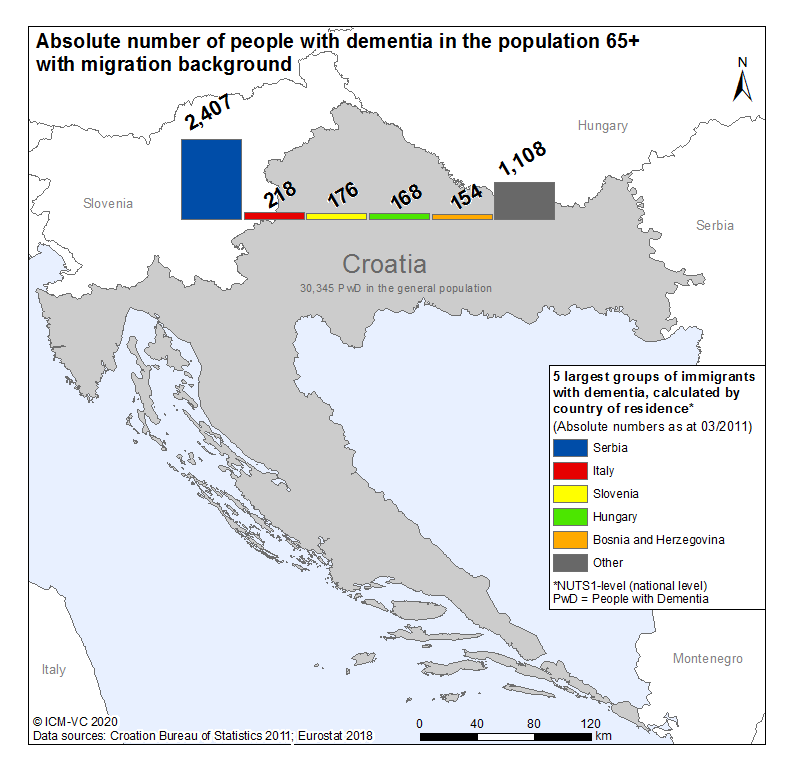EU-Atlas: Dementia & Migration
| Largest group | 2. largest group | 3. largest group | 4. largest group | 5. largest group | |
| Absolute numbers | |||||
| PwMD per 100,000 inhabitants 65+ |
| Absolute numbers | PwMD per 100,000 inhabitants 65+ | |
| Largest group | ||
| 2. largest group | ||
| 3. largest group | ||
| 4. largest group | ||
| 5. largest group |
| Prevalence per 100,000 inhabitants 65+*, calculated by country of residence | |||
|---|---|---|---|
| high > PwMD |
minor > - PwMD |
||
| increased > - PwMD |
low ≤ PwMD | ||
| medium > - PwMD |
|||
| PwMD = People with a Migration background with Dementia *Bulgarien, Litauen, Malta, Polen in der Bevölkerung 60+ |
|||
| Absolute number of PwMD 65+ | |
| PwMD per 100,000 inhabitants 65+ |
Croatia
Croatia can clearly be described as a country of emigration. The history of emigration originated in the 15th century. Larger emigration movements towards Western Europe (e.g. to Germany, Belgium, or France) occurred, for example, between 1890 and 1914 as well as from 1964 to the early 1970s1. Simultaneously, larger groups of people also immigrated to Croatia, in the past mainly from economically disadvantaged parts of Yugoslavia1, but in the second half of the 20th century also from the Middle East2. In 2013, the largest migrant groups were from Bosnia Herzegovina (499,100), Serbia (118,100), Slovenia (47,800), Montenegro (39,400), and North Macedonia (20,700)3. The migrant population (born abroad, 674,100 to 518,000) and the proportion of migrants in the total population (14.6% to 12.5%) decreased slightly between 1995 and 20194.
There are 105,800 people with a migration background aged 65 or older. Of those, approx. 4,200 are estimated to exhibit some form of dementia. Calculations show the most affected migrant groups presumably originate from Serbia (approx. 2,400), Italy (approx. 200), Slovenia (approx. 200), Hungary (approx. 200), and Bosnia and Herzegovina (approx. 200)5.
Although no national dementia plan could be identified for Croatia, clinical guidelines for the pharmacological treatment of dementia from 2015 were found. This document has a volume of seven pages and deals with the starting point for the development of the strategy (epidemiology of Alzheimer's disease, obligations of the Republic of Croatia, mission of the Croatian Association for Alzheimer's Disease), the strategic framework (purpose, main goals, principles of the strategy), and the strategic areas in the fight against Alzheimer's Disease. The strategic areas include early diagnosis of Alzheimer's Disease, availability of treatment such as anti-dementia drugs, access to social benefits and services, development of systematic support for patients and their families, and destigmatisation. However, the guidelines do no refer to the topic of migration6.
References
- Mlinarić D, Bara M, Gregurović S, Župarić-Iljić D, Kuti S: Croatian migration history and the challenges of migrations today. [https://aemi.eu/croatian-migration-history-and-the-challenges-of-migrations-today/]. (2015). Accessed 14 Apr 2020.
- Knezović S, Grošinić M: Migration trends in croatia. In. Edited by Hanns-Seidel-Stiftung. Zagreb; 2017.
- United Nations: Migration Profiles: Croatia; 2013.
- International Organization for Migration: International migrant stock as a percentage of the total population at mid-year 2019: Croatia; 2019.
- Croatian Bureau of Statistics: Census of Population, Households and Dwellings 2011, Population by Citizenship, Ethnicity, Religion and Mother Tongue. In. Zagreb: Croatian Bureau of Statistics; 2013.
- Mimica N, Kušan Jukić M, Presečki P, Ivičić M, Braš M, Vrbić L, Boban M, Pivac N, Brinar P, Vuksan-Ćusa B et al: Hrvatska strategija borbe protiv Alzheimerove bolesti i drugih demencija - prijedlog nacrta uz nadopune. Medix 2015, XXI:111-118.


![[Translate to Englisch:] Logo RBS [Translate to Englisch:] Logo RBS](/fileadmin/_processed_/9/7/csm_RBS_Logo_RGB_0e245a98a4.jpeg)